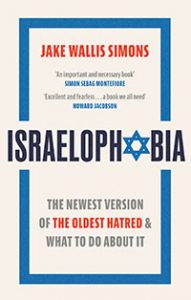“Israelophobia inhabits a divisive space, even amongst those defining the parameters of modern antisemitism.” – CHACR Fellow Ben Tomlinson reviews Jake Wallis Simons’ timely take on a new age of antisemitism.
Read the digital document above or continuing reading below.
TIMELY TALE OF A NEW AGE OF ANTISEMITISM
TITLE: Israelophobia: The newest version of the oldest hatred & what to do about it
AUTHOR: Jake Wallis Simons
REVIEWER: Captain Ben Tomlinson, Visiting Fellow, CHACR
 “The old antisemitism,” writes Jake Wallis Simons in Israelophobia, “was a known quantity. It was cartoons of Jews with hooked noses and bags of money. It was Fagin and The Merchant of Venice.” However, in recent times, he asserts, this hatred has shifted.
“The old antisemitism,” writes Jake Wallis Simons in Israelophobia, “was a known quantity. It was cartoons of Jews with hooked noses and bags of money. It was Fagin and The Merchant of Venice.” However, in recent times, he asserts, this hatred has shifted.
It has become more discreet and more disguised. Instead, the author argues, anti-Jewish bigotry now focuses not so much on religion or race as it did in the Middle Ages or the 20th Century, but on the Jewish state of Israel. In fact, arguments against Israel are so littered with the tropes of historical antisemitism that the current anti-Israeli sentiment, or “Israelophobia” as Wallis Simons names it, must simply be recognised as the latest manifestation of antisemitism.
Wallis Simons is well placed to discuss modern iterations of antisemitism. Having worked as a Sky News and BBC Radio 4 commentator, he now presides as the editor of The Jewish Chronicle – the world’s oldest Jewish newspaper – where he reported extensively on antisemitism within Jeremy Corbyn’s Labour Party. Much of this work invigorated discussions around British antisemitism, which was sustained by David Baddiel in his 2021 prize-winning book, Jews Don’t Count. Baddiel’s work, which asserts that, in a time of intensely heightened awareness of minorities, Jewish people aren’t counted as a real minority, purposefully omits discussions around Israel as to focus his analysis “in a way that some Jews can’t”. However, in omitting this topic, Wallis Simons describes Jews Don’t Count as having “vacated the bloodiest battlefield” of antisemitic refutation. Israelophobia therefore inhabits a divisive space, even amongst those defining the parameters of modern antisemitism.
There remains, without doubt, a serious issue of antisemitism in the UK. Whilst comprising just 0.5 per cent of the population, “British Jews face nearly a quarter of all hate crimes”, and the backlash in the wake of the current Israeli-Palestinian conflict only serves to highlight this phenomenon. Similarly, Wallis Simons expresses concerns over the prevalence and popularity of antisemitic narratives amongst educated and liberally progressive audiences. “A dislike for Israel,” he writes, “has become a core part of a suite of views held by the progressives who set the tenor of much of our culture,” so much so, that “on campus, fighting the bogeyman of the Jewish state has become the most desirable of causes… a central plank in this new progressive credo”. Nonetheless, Israelophobia’s equation of critiquing Israel and antisemitism appears to be a large step which can’t be bridged by its use of ‘whataboutery’. Wallis Simons’ argument is thought provoking and necessary. However, occasionally, it is made with more passion than substance.
Published by Constable, Hardback, £12.99, ISBN-13: 9781408719275.





